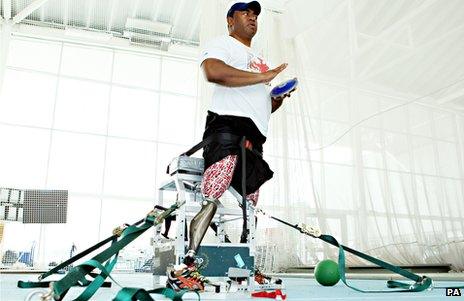'Bionic legs' for military amputees
- Published

Former soldier and Paralympian Derek Derenalagi with his "bionic leg"
Injured military personnel who have legs amputated are to be given the most up-to-date prosthetic limbs after the government set aside £6.5m for them.
The micro-processor limbs, known as "bionic legs", will be available to service personnel who have been wounded in Iraq or Afghanistan and will offer them greater stability and mobility.
The move is expected to benefit about 160 members of the armed forces.
The Help for Heroes charity said the money would help "transform lives".
Defence Secretary Philip Hammond said it was a top priority to give troops the best possible care and support.
Chancellor George Osborne, who is making the money available from the Treasury's special reserve, added: "Our troops are heroes who have and continue to give absolutely everything for their country and it is only right that we do everything possible to help them, especially when they suffer injury.
Walk backwards
"I am delighted, therefore, that we have been able to make funding available for this cutting-edge prosthetic technology, which will go a long way to improving the lives of people who have done so much for the UK."
Defence Minister Mark Francois says the money will provide "the best, most capable legs" for those wounded
Experts say the "bionic legs" - the same as those used by Paralympics discus thrower and former soldier Derek Derenalagi - will significantly improve the quality of life and speed of rehabilitation for amputees.
The new technology provides better stability and greater mobility, as well as improvements in the ability to step over obstacles, negotiate stairs and walk backwards safely.
The limbs will be fitted where clinically appropriate at the Headley Court military rehabilitation centre in Surrey.
Captain Nick Beighton: "I'm a typical soldier, we want the newest, shiniest things."
Paralympic rower Captain Nick Beighton, who lost both legs in an explosion during a foot patrol in Afghanistan in 2009, welcomed the micro processor limbs as a "big step up in technology".
"To have the opportunity to try it and to use it and get the latest technology is fabulous for us because it just gives us that freedom to get out and do more things and have greater functionality and more independence," said the 31-year-old London 2012 competitor.
'Proven benefits'
Surgeon General Air Marshal Paul Evans said: "The next generation of micro processor knee is a fantastic prosthetic development and now seen to have proven benefits for certain amputees. It will improve the quality of life and rehabilitation for our patients, where it is clinically suitable.
"Not only does it provide better stability and improved mobility but will also help reduce back pain and aid rehabilitation generally."
Bryn Parry, chief executive of the Help for Heroes charity, said: "Our wounded servicemen, women and veterans deserve the best. This announcement will help transform lives.
"We must remember that there is no one-size-fits-all solution and that each individual must be given the best prosthetic for them."
- Published19 February 2013
- Published19 February 2013
- Published20 June 2012
- Published21 October 2011